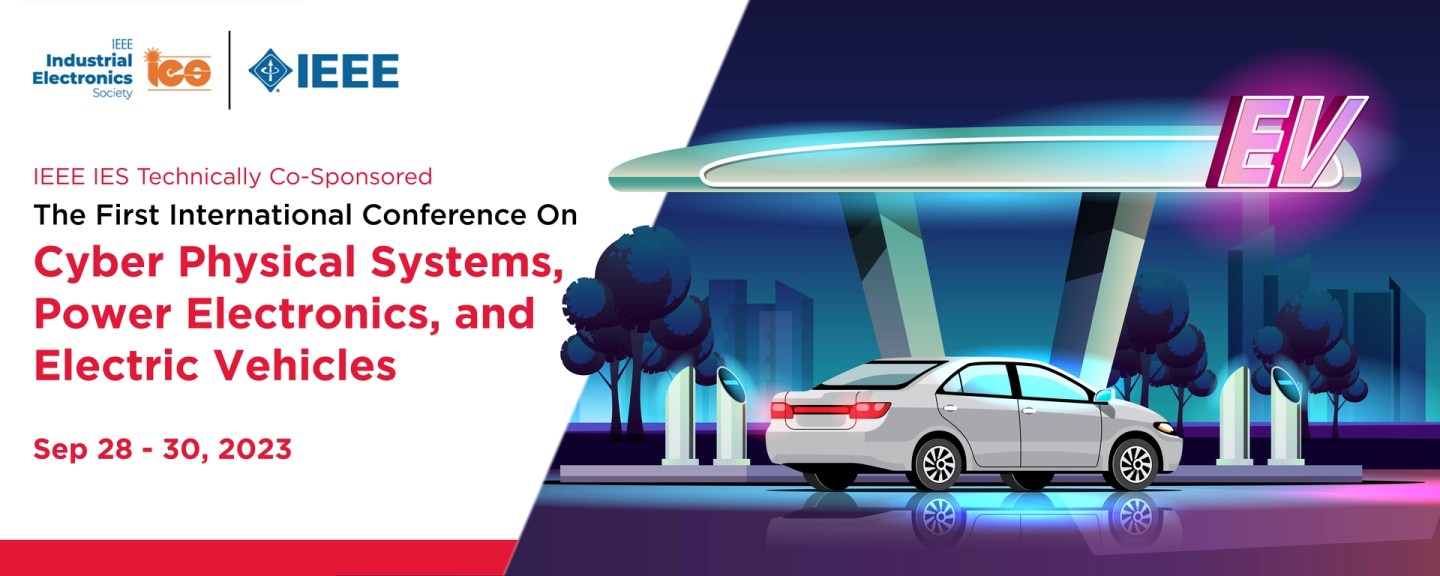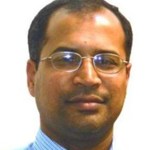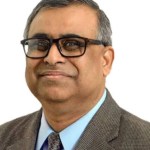
Icpeev-2023
About Conference
The First International Conference on Cyber physical Systems, Power Electronics and Electric Vehicles- ICPEEV 2023 will be held at Mahindra University, Hyderabad, India, from Sep-28th to 30th -2023. The objective of this conference is to provide a platform and opportunities for researchers, scientists, scholars and engineers to exchange their research experiences and share new ideas to promote their research progress in the field of IoT, Cyber Physical Systems, Power Electronics, Electric Vehicles and Vehicle Engineering with the discussion on practical issues, challenges encountered as well as solutions adopted.
The conference will consist of keynote lectures by invited experts and technical paper presentations by practitioners. We invite submission of papers from all areas of Power Electronics and Power Systems Engineering, Electric vehicles and Battery charging and Computational Intelligence, both emerging topics which form the theme of the conference as well as more established areas, presenting developments in algorithms as well as applications.
Modified and Improved Version of the Conference Paper
Authors can submit extended version of this conference papers to the “IEEE Journal of Emerging and Selected Topics in Industrial Electronics”. Manuscripts in conference category must cite the conference paper in the reference. Papers must be within the scope of IES and in emerging areas only as listed in the JESTIE website. Authors may submit modified and improved versions of the conference paper. Similarity-index should be below 50% considering all related publications including the “conference paper”. Maximum page length at the time of submission to be between 8 to 10 pages (including photo and bio of the authors if authors prefer to add the same).
All Accepted and Presented Papers will be submitted for inclusion into IEEE Xplore subject to meeting IExplore’s scope and quality requirements.
Topics
Cyber Physical Systems (CPS)
- AI and Machine Learning for CPS including Safe Autonomy
- Safety and Resilience for CPS
- Architectures and Networking for CPS
- Software platforms and systems for CPS
- Human-machine interactions
- Sensing and monitoring
- Security, trust, and privacy in CPS
IoT
- Artificial Neural Networks, Fuzzy Systems and Hybrid Systems
- Computational Intelligence and Evolutionary Computation
- Data Communication, Computer Network and Security & Forensic
- Decision Support and Recommender Systems
- Data Mining, Knowledge Discovery, and Knowledge Management
- Image Processing and Pattern Recognition
- Information Technology and Computer Education
- Other topics related to ICT and its Applications
Power Electronics
- Analysis, control, and design of power converters, electrical machines and drives
- Emerging converter topologies, modeling, simulation, and control
- Design and applications of wide band gap power electronic devices (SiC, GaN)
- Motor drive technologies for industrial applications
- Power converters for EV chargers and power-train
- Battery management systems, emerging storage technologies and fuel cells
- Health monitoring, predictive maintenance of electrical machines, and power converters
- Power converters for renewable energy integration at distribution levels
- Grid-forming and grid-following controls
- Grid-connected energy storage systems and their control
- Demand-side management and ancillary services for large-scale integration of renewables
- EV charging technologies and their impact on grid operation
- Policy, grid code, and regulatory framework for renewable energy integration, and operation
Topics related to Electric Vehicles
- Battery technologies and Battery management system (BMS)
- Alternate technologies for Electric Vehicles such as hydrogen fuel cell
- Supercapacitors, ultracapacitors, electric double layer capacitors (EDLC)
- Energy harvesting (regeneration, kinetic energy recovery systems (KERS), regenerative braking, photovoltaics etc.)
- Light electric vehicles (LEV)
- MicroEVs, cars, buses etc.
- Pure electric vehicles
- Electric aircraft
- Military, police and security vehicles
- Autonomous vehicles for land, water and air
Renewable Energy Systems
- Renewable power generation and clean energy technologies
- Battery, hydrogen, and fuel cell storage system
- Power converters for renewable energy integration at transmission and distribution levels
- Grid-forming and grid-following controls
- Grid-connected energy storage systems and their control
- Demand-side management and ancillary services for large-scale integration of renewables
- Flexibility, inertial control
- Stability and power quality issues
- EV charging technologies and their impact on grid operation
- Policy, grid code, and regulatory framework for renewable energy integration, and operation
VLSI
- Embedded Systems Hardware: HW/SW co-design, SoC, multi-core systems, board level hardware, HW security, Internet-of-Things (IoT) devices, sensors/actuators, displays.
- Embedded Systems Software: Operating systems, firmware, algorithms, middleware, runtimes, parallelization, virtualization, software for low power, security, reliability, real-time support, emerging applications (e.g., automotive, telematics, analytics).
- FPGA and Reconfigurable Systems: FPGA architecture and FPGA circuit design, CAD for FPGA, FPGA prototyping, FPGA-based accelerators.
- Wireless Systems: Sensor networks, low-power wireless systems, wireless protocols, wireless power delivery.
- Embedded Case Studies: Practical and industrial tools, methodologies, designs in various application areas: wireless, medical, networking, multimedia, automotive, controls, etc.
Committee
International Steering Committee
- Yajulu Medury, Vice-Chancellor, Mahindra University, India
- Abdelkader Elkamel, Professor, The École Centrale de Lille
- Dr. Shankar Venugopal, Vice President, Mahindra Research Valley, Chennai
- Arya Kumar Bhattacharya, Dean Research, Mahindra University
- Prof. Bishnu Pal
General Co-Chairs
- Prof. Sukumar Mishra, Professor, Associate Dean R&D, Indian Institute of Technology Delhi, New Delhi
Technical Program Committee Chairs
- Prof. Ramakrishnan Maheshwari, Southern University of Denmark
- Prof. Bhuvaneswari Gurumoorthy
- Prof. Ram Mohan Vemuri
Advisory Committee Members
- Prof. Jayantlal Bhattacharya, Mahindra University, Hyderabad
- Prof. Kalluri Ramalinga, Mahindra University, Hyderabad
- Prof. Sunil Bhoosan, Mahindra University, Hyderabad
Organizing Committee Members
- Dr. Bhargava Rajaram, Mahindra University, Hyderabad
- Dr. Gopinath GR, Mahindra University, Hyderabad
Publications Committee Chairs
- Dr. Subbarao Boddu, Mahindra University, Hyderabad
- Dr. Pooran Singh, Mahindra University, Hyderabad
Finance and Sponsorship Committee Chair
- Dr. Aditya Abburi, Mahindra University, Hyderabad
Publicity Committee Chairs
- Yaminidhar Reddy Bhavanam, Mahindra University
Tutorials Committee Chairs
- Dr. Sayantan Hazra, Mahindra University
Special Sessions Chair
- Dr. Ramakant, Mahindra University
Social Media Chair
- Dr. Akshara and Dr. Ankita, Mahindra University, Hyderabad
Conflict of Interest Chair
- Dr. Aditya Abburi, Mahindra University
Technical Committee Members
- Prof. B Subudhi, Dean R&D, IIT Goa
- Pabitra Mitra, IIT KGP
- Tandra Pal, NIT Durgapur
- J. Balasubramaniam, IIT Hyderabad
- Tingwen Huang, Texas A&M University at Qatar
- Jian Wang, China University of Petroleum
- Yew Soon Ong, Nanyang Technological University, Singapore
- Kaustuv Nag, IIIT Guwahati
- Sambit Bakshi, NIT Rourkela
- Nishchal K. Verma, IIT Kanpur
- Mukesh Prasad, University of Technology, Sydney
- Manoranjan Mohanty, University of Technology, Sydney
- OmPrakash Kaiwartya, Nottingham Trent University, UK
- Khaldoon Dhou, Texas A&M University – Central Texas, USA
- Aruna Tiwari, IIT Indore
- Jagdish Bansal, South Asian University, New Delhi
- Barsha Mitra, BITS Pilani, Hyderabad Campus
- K.V. Sambasivarao, NRI Institute of Technology, Andhra Pradesh
- Deepak K T, Indian Institute of Information Technology Dharwad
- Dipanjan Roy, Insitute for Development and Research in Banking Technology, Hyderabad
- Ashish Jain, Manipal University Jaipur
- Rudresh Dwivedi, Netaji Subhas University of Technology, Delhi
- Shikha Mehta, Jaypee Institute of Information Technology
- Krishna Asawa, Jaypee Institute of Information Technology
- Himanshu Mittal, Jaypee Institute of Information Technology
- Payal Khurana Batra, Jaypee Institute of Information Technology
- Navneet Pratap Singh, Bennett University
- Dilip Singh Sisodiya, NIT Raipur
- Himani Bansal, Jaypee Institute of Information Technology
- Nikhil Tripathi, Indian Institute of Information Technology Sricity
- Arun Chauhan, Graphics Era University
- Udit Satija, Indian Institute of Technology Patna
- Aruna Malapati, BITS Pilani, Hyderabad Campus
- Amit Saxena, Guru Ghasidas University
- Lokesh Singh, Manipal University Jaipur
- Prakash Chandra Sharma, Manipal University Jaipur
- V. Ravi, Institute for Development and Research in Banking Technology, Hyderabad
- Animesh Chaturvedi, Indian Institute of Information Technology Dharwad
- Mala Saraswat, ABES Engineering College
- Srishti Sharma, The Northcap University
- Vaishali Soni, SGTB Khalsa College, University of Delhi
- Deepak Sharma, Bennett University
- Sulabh Tyagi, Jaypee Institute of Information Technology
- Sanatan Sukhija, Mahindra University
- Om Prakash Patel, Mahindra University
- Yayati Gupta, Mahindra University
- Sunny Rai, Mahindra University
- Venkata Dilip Kumar, Mahindra University
- Dipti Mishra, Mahindra University
- Venkata Rajesh Kumar Tavva, Mahindra University
- Bharghava Rajaram, Mahindra University
- Sreedhar Madichetty, Mahindra University
- Jayasri D, Mahindra University
- Rama Murthy Garimella, Mahindra University
- Sowmini Devi, Mahindra University
- Bhanukiran Perabathini, Mahindra University
- Ankita Jain, Mahindra University
- Geeta Rani, Manipal University Jaipur
- Manpreet Kaur, Manav Rachna University
- Pinaki Chakraborty, Netaji Subhas University of Technology
- Ruchi Mittal, Ganga Institute of Technology & Management
- Manju, Jaypee Institute of Information Technology
- Rohit Beniwal, Delhi Technological University
- Vidhi Khanduja, The NorthCap University
- Ramalinga Swamy, NIT Warangal
- Devendra K Tayal, IGDTUW
- Amita Jain, Netaji Subhas University of Technology
- Esha Baidya Kayal, IIT Delhi
- Sushma Hans, Amity University, Dubai
- Shikha Gupta, Maharaja Agrasen Institute of Technology
- Ruchi Sharma, The Neotia University
- Rahul Chandra, Delhi Technological University
- Minni Jain, Delhi Technological University
- Prof. Ramakrishnan Maheshwari, Southern University of Denmark
Contact Details
Conference Chair
Prof. Sreedhar Madichetty,
Department of Electronics and Computer Engineering, Ecole Centrale School of Engineering
Email: sreedhar.madichetty@mahindrauniversity.edu.in
Phone: +91-9703845823
Student Volunteer
Mr. Suprabhath Koduru
Department of Electronics and Computer Engineering
Email: sriranga20peee002@mahindrauniversity.edu.in
Phone: +91-8801868683
Call for Papers
| Paper Submission Deadline | 07th July 2023 |
| Decision Notification | 07th August 2023 |
| Final Paper Submission | 25th August 2023 |
| Early Bird Registration | 30th August 2023 |
Paper submission link Click here
Paper Submission Templates Click here
 Dr SHANKAR VENUGOPAL
Dr SHANKAR VENUGOPAL
Vice President, Mahindra & Mahindra
Mahindra Research Valley, Chennai.
https://www.linkedin.com/in/shankarvenugopal/
Dr Shankar leads technology innovation for the Automotive & Farm services business (AFS). He heads the intellectual property (Patents) and knowledge management functions. He is also the Dean of the Mahindra Technical Academy.
Shankar is passionate about developing sustainable urban mobility solutions and his current interests span across electric vehicles, connected vehicles, autonomous vehicles and precision farming.
Prior to joining Mahindra & Mahindra, Shankar has held technology innovation leadership roles at GE, Dow, Honeywell and Cummins. He holds ten international patents and numerous new product innovation awards. He was awarded GE”s Edison Inventor Medal early in his career. He has developed a proprietary innovation methodology – Innovation FLOW – and trained 1000 + inventors and innovators.
Shankar obtained a Ph.D in Materials Science and a gold medal for the best doctoral thesis from the Indian Institute of Science, Bangalore. He completed his executive management program from the Indian Institute of Management, Bangalore.
Shankar is an avid reader and is interested in physics, philosophy and psychology. He teaches technology innovation management at premier engineering & management institutes in India & abroad.
Shankar was recognized as one of the 50 Innovative leaders at the World Innovation Congress 2020. He is also a TEDx speaker.
Dr Shankar leads the Confederation of Indian Industries (CII)’s Technology, Innovation, Intellectual Property and Thought Leadership initiatives. He is a management committee member of the Society of Automotive Engineers (SAE) and he chairs the committee for Branding and Communication (B&C).

Ned Mohan
Regents Professor, Oscar A. Schott Professor, Department of Electrical and Computer Engineering
Mission
Primary Research Focus (Sustainability):
Interfacing renewable energy sources with the utility grid to increase their penetration; increasing energy- efficiency usage; making Power Systems more robust and reliable; energy storage.
Primary Education Focus:
Sustaining the national infrastructure in the area of electric power and energy by revitalizing the curriculum and disseminating it widely.
Primary Outreach Focus:
Conveying the need to combat
- Climate Change, and
- Ideological Extremism
Contact
612-625-3362
mohan@umn.edu
Kenneth H. Keller Hall
Room 5-111 200 Union Street Se Minneapolis, MN 55455

Dr. Rajendra Naik
GE Healthcare
Rajendra Naik obtained the BTech degree in electrical and electronics engineering from the IIT, Chennai in 1991, and the MS and PhD degrees in EE from the University of Minnesota, Minneapolis, USA in 1993 and 1996 respectively, with specialization in Power Electronics.
He started his professional career with Smith Equipment, Watertown, South Dakota in 1996, where he was responsible for developing power supplies for plasma based metal cutting equipment. From 1998 to April 2005, he was with Advanced Technology, Allen Bradley-Rockwell Automation, Milwaukee, Wisconsin, where he was involved in the development of various topologies for motor drives. He was also a part time instructor for power systems and power electronics at Marquette University and the University of Wisconsin, Milwaukee for several years. He obtained the MBA degree from the University of Wisconsin in 2004.
He joined GE Global Research, Bangalore in April 2005 and held several technical and managerial roles over the next 13 years, with research focus on power electronic topologies, renewable energy/distributed generation and energy storage. Since 2019, he has been with the Maternal and Infant Care business of GE HealthCare. In his current role as Principal Engineer – Hardware, he is responsible for guiding new product development, supporting installed base challenges and mentoring. He has authored several IEEE conference and journal papers and has 18 issued US patents.

Professor Subhashish Bhattacharya
Duke Energy Distinguished Professor, Electrical and Computer Engineering, North Carolina State University
Subhashish Bhattacharya is currently Duke Energy Distinguished Professor in the Department of ECE at NC State University. He received B.E. from IIT-Roorkee, India, M.E. from IISc, India, and Ph.D. from University of Wisconsin-Madison, all in electrical engineering. He was with FACTS and Power Quality Division at Westinghouse R&D and Siemens Power Transmission & Distribution, from 1998 to 2005. He joined NCSU in August 2005, where he is a founding faculty member of NSF FREEDM Center, ATEC and DoE Institute PowerAmerica. A part of his PhD research on active power filters was commercialized by York Corporation. His research interests are Solid-State Transformers with SiC devices, Integration of renewable energy resources, Microgrids, high-frequency magnetics, active filters, and the application of new power semiconductor devices such as SiC and GaN for power converters. His research is funded by several industries, NSF, DoE/ARPA-E, Navy, NASA. He has over 650 publications, 10 patents, H-index of 66, and 18,500+ citations.
https://ece.ncsu.edu/people/sbhatta4/
https://orcid.org/0000-0001-9311-5744
Google Scholar:
Registration Details:
| Sl.No | Type of Registration (Attendee ⇒ No paper in Conference) | Registration Fee | Early Bird Registration Fee (30th August 2023) | Foreign Delegates Registration Fee |
|---|---|---|---|---|
| 1 | IEEE Member | ₹10,000 | ₹8,000 | $120 |
| 2 | Non-IEEE Member | ₹12,000 | ₹10,000 | $150 |
| 3 | Student IEEE Member | ₹7,000 | ₹5,000 | $75 |
| 4 | Student Non-IEEE Member | ₹9,000 | ₹7,000 | $100 |
| 5 | Attendee with tutorials. | ₹5,000 | ₹3,000 | $50 |
| 6 | IES member | ₹9,000 | ₹7,000 | $100 |
Register Here:
Go to : https://eazypay.icicibank.com
Search for Mahindra University and fill in the details
Event Name: ICPEEV 2023 and pay the applicable amount
Then fill out the following form to complete the registration
https://forms.office.com/r/hLM3F5EwA2
How to Reach Mahindra University
Location of Mahindra University: https://goo.gl/maps/5dcyCPJ2JNT2
Airport to Mahindra University: https://goo.gl/maps/9Ur8LsBNzcP2
Secunderabad to Mahindra University: https://goo.gl/maps/HwRgbVt4M9A2
From Rajiv Gandhi International Airport, Hyderabad
- Hire Meru/Sky Cabs and travel to Mahindra University via the Outer Ring Road.
- The distance is around 75km and the cost will be around INR 1700.
- The cab drivers will recognize Mahindra University location as Tech Mahindra Technology Park in Bahadurpally (near Gandimaisamma)
From Secunderabad/Kachiguda/Nampally Railway Stations
- Hire Ola/Uber Cabs from any of these railway stations to Mahindra University
From Jubilee Bus Stop
- From Secunderabad (JBS) to Mahindra University: Take Bus no 227, 272, or 230 and exit at Bahadurpally cross roads.
- Take an auto the Tech Mahindra Technology Park.
From Nampally/MGBS Stop
- Take Bus no 9K and exit at Bahadurpally cross roads.
- Take an auto the Tech Mahindra Technology Park.
From Kachiguda Stop
- Take Bus No. 49K to Secunderabad (JBS).
- Take Bus no. 227, 272, or 230 and exit at Bahadurpally cross roads.
- Take an auto the Tech Mahindra Technology Park.
FAQ for Authors
1. How to do registration
Ans: You can do registration by using Gpay link/ Direct Money from our website
2. How will get the receipt?
Ans: Receipt of Payumoney is valid for us, you will get original conference receipt at venue.
3. I completed registration, what is the next step?
Ans: After registration you have to complete the process of submission of camera ready paper and copyright form online.
4. When will get the link of camera ready paper and copyright submission link
Ans: Please refer important dates
5. What is meaning of Full Paper registration?
Ans: Full paper registration is mandatory for presenting the paper.
6. What is co author?
Ans: Once full author registration completed then only co author registration is applicable , it is for the any author who wish to present paper or even attend the conference
7. How many certificates will be issue in maximum?
Ans: Three, You will have to pay extra for extra certificate.
8. When will get the invitation letter for Visa
Ans: We will issue the Visa letter after completing the registration.
9. Can you provide Accommodation?
Ans: We have a separate dedicated team for accommodation; Guest House/ Hostel accommodation will be provided for interested authors on extra payment basis.
10. When will get the certificate?
Ans: During your presentation session you will get it.
11. How many pages are allowed?
Ans: Maximum number of pages allowed is 6.
12. What is the Registration fee?
Ans: Registration fee for attendees is 50 % of full registration.


















